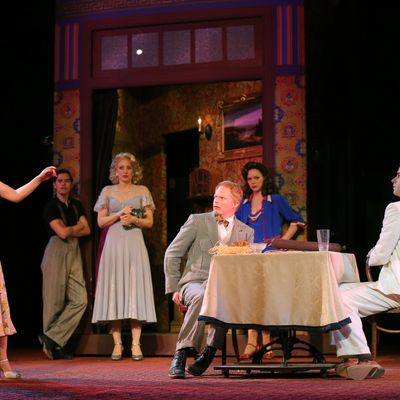
“Where’s the money?” is, by a full fathom, the least appreciated famous-line Shakespeare ever wrote. The proper Elizabethan pronunciation, of course, is “wheyah’s da money?”—at least, according to Daniel Sullivan, Dean of Popular Bardology at the Public Theater and Shakespeare in the Park’s go-to Great Communicator. His cheerfully populist guys-and-dolls-and-clones interpretation of The Comedy of Errors—a clockwork Plautine comedy that needs little interpretation and, for exactly that reason, is always in danger of getting way too much of it—isn’t smothered under trowelfuls of thoughtful dramaturgy. No, Sullivan’s basically just changing ducats to dollars, supplicating the spirit of Damon Runyon, and hoping he makes money on the exchange (and receives no hate mail from Stephen Greenblatt). The bet pays off: everyone wins. Except, occasionally, the meter. But hell, we’re Americans. Throw the meter! Cash up front!
This buoyant, joyous, shamelessly weightless Park production relocates the classic tale of mistaken identity (a madcap day of farcical misunderstandings and near-misses, featuring two sets of identical twins sporting identical names) from imaginary Aegean antiquity to an upstate New York gambler’s paradise in the nineteenth thirties, a quasi-Saratogan ‘burg overrun with pinstriped toughs out of Dick Tracy and overseen by a Godfatherly “Duke” (the versatile caricaturist Skip Sudduth) whose marinara-soaked first line sets the tone for the whole night: “Merchant of SeerahKYOOsah, plead no more.” Then the wonderfully deflated Jonathan Hadary, as Egeon, the merchant in question, sentenced to death for venturing onto unfriendly turf in search of his son Antipholus, launches into the play’s infamously extended backstory. (His twin boys, both named Antipholus, were separated in infancy by sea-wrack, as were their identical servants, both named Dromio.) Sullivan presents the windy tale as vaudeville prop comedy, a solution as elegant as it is doggedly unserious. We’re hooked on confectioner’s sugar within minutes, and that’s before you get a snootful of Hamish Linklater and Jesse Tyler Ferguson, two of our culture’s finest young clowns, cutting up royally in dual roles.
Linklater, playing both pious, nervous, romantic Antipholus of Syracuse and caddish, sharp-lapeled Antipholus of Ephesus, once again proves himself one of our great comic stage actors; his jellylegged physical comedy never reads as “physical comedy,” but as a natural extension of his natural bendy-beanpole presence. Ferguson takes his dour masochism to new heights as Dromio, the fool-me-once-beat-me-twice slave whose attempts to serve two (identical) masters reap him a harvest of cartoonish pain. Lemon-tart Emily Bergl (as the apoplectic, Adelaidesque Adriana) and off-Broadway goddess Heidi Schreck (as her tsking sister Luciana) keep up with the boys from upstate, step for step, and the triple-threat ensemble is among the strongest troupe yet assembled for Park duty.
This is, by the way, an explicitly post-One Man, Two Guvnors take on The Comedy of Errors—appropriately enough, considering their similar and similarly venerable literary DNA—and if the show never quite hits those James Cordenian heights of acrobatic mayhem, the more contained, more abashed antics of Linklater-and-Ferguson have a unique and triumphant apmpeal all their own. As usual, Greg Pliska’s witty musical arrangements delight (his swingin’ take on “Sigh No More,” as warbled by multitalented thrush De’adre Aziza, is a showstopper) and provide a big-band lift to rival any skiffle outfit. So put your ducats in dollars with an easy mind: your investment is safe, no matter what you paid your scalper. (This town, god knows, is full of cozenage.)
The Comedy of Errors is playing at the Delacorte Theater in Central Park through June 30.

